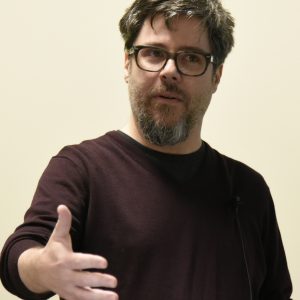Other Event
Less Metrics, More Rando: (Net) Art as Software Research

How are numbers on Facebook changing what we "like" and who we "friend" ? Why does a bit of nonsense sent via email scare both your mom and the NSA? What makes someone mad when they learn Google can't see where they stand? From net art to robotics to supercuts to e-lit, Ben Grosser will discuss several artworks that illustrate his methods for investigating the culture of software.
Artist Ben Grosser creates interactive experiences, machines, and systems that examine the cultural, social, and political implications of software. Recent exhibition venues include Eyebeam in New York, Arebyte in London, Museum Kesselhaus in Berlin, Museu das Comunicationes in Lisbon, and Galerie Charlot in Paris. His works have been featured in The New Yorker, Wired, The Atlantic, The Guardian, The Washington Post, El País, Libération, S&uumul;ddeutsche Zeitung, and Der Spiegel. The Chicago Tribune called him the "unrivaled king of ominous gibberish." Slate referred to his work as "creative civil disobedience in the digital age." Grosser's recognitions include First Prize in VIDA 16, and the Expanded Media Award for Network Culture from Stuttgarter Filmwinter. His writing about the cultural effects of technology has been published in journals such as Computational Culture, Media-N, and Big Data and Society. Grosser is an assistant professor of new media at the School of Art + Design, co-founder of the Critical Technology Studies Lab at the National Center for Supercomputing Applications, and an affiliate faculty member with the Unit for Criticism and the School of Information Sciences, all at the University of Illinois at Urbana-Champaign.
This talk is part of the new CRITICAL x DESIGN speaker series and the "soft opening" of the Center for Ethics, Society, and Computing (ESC) at the University of Michigan.
This event is generously supported by the School of Information; the Center for Political Studies at the Institute for Social Research; and the Department of Communication Studies in the College of Literature, Science, and the Arts at the University of Michigan.
 MENU
MENU 
